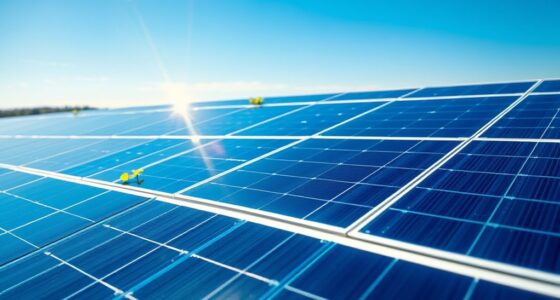If you’re new to solar energy, you’ll find that most panels require minimal maintenance, mainly cleaning and inspections for damage or shading. Cloudy days still produce electricity, and cold weather can boost efficiency. Installation costs have dropped, and incentives make solar more affordable. Understanding these basics helps you get the most from your system and avoid common myths. Keep exploring, and you’ll discover even more ways to harness the sun’s power effectively.
Key Takeaways
- Solar panels require minimal maintenance, mainly cleaning and regular inspections for damage or shading.
- They can generate electricity on cloudy days and perform better in cold weather.
- Installation costs have decreased, and various incentives make solar more affordable for beginners.
- Shading, environmental factors, and panel angle influence solar efficiency and energy output.
- Understanding common myths helps beginners make confident decisions about adopting solar technology.

If you’re new to renewable energy, solar power is an excellent place to start. It’s accessible, cost-effective, and can considerably reduce your carbon footprint. When you decide to install solar panels, one of the first questions that might come to mind is about maintenance. Many believe that solar panel maintenance is complicated or expensive, but in reality, it’s quite manageable. Most solar panels require minimal upkeep; simply keeping them clean and free of debris is enough to guarantee peak performance. Rain often washes away dust and dirt, but in dry or dusty climates, you might need to occasionally hose them down. Regular inspections for damage or shading from nearby trees or buildings are also recommended, but these tasks are straightforward. Proper solar panel maintenance helps maximize energy output and prolongs the lifespan of your system, making your investment worthwhile. Additionally, understanding the impact of environmental factors on solar efficiency can help you optimize your system’s performance.
Another common concern for beginners involves solar energy myths. There are several misconceptions that can discourage people from adopting solar technology. For example, some believe that solar panels won’t work on cloudy days or in cold weather. In truth, solar panels still generate electricity in overcast conditions, and cold temperatures can even improve their efficiency. Others assume that installing solar panels is prohibitively expensive, but the costs have decreased dramatically over recent years, and many regions offer incentives, rebates, or financing options that make going solar more affordable. Some think that solar energy is only suitable for homeowners with large roofs or perfect sunlight exposure, but there are various solutions, including ground-mounted systems and solar panels optimized for different angles and shading conditions. Debunking these solar energy myths is vital because misinformation can prevent you from exploring a clean, renewable source of power that might be perfect for your needs.
Getting started with solar energy doesn’t mean you need to become an expert overnight. It’s about understanding the basics—like how to handle solar panel maintenance and recognizing that many common myths are just misconceptions. Once you have accurate information, you can make confident decisions about installing solar panels, whether you’re aiming to cut costs, reduce your environmental impact, or both. Remember, solar technology continues to evolve, making it more efficient and accessible than ever before. With a little effort in maintenance and a clear understanding of the facts, you’ll be well on your way to harnessing the sun’s power effectively. Embracing solar energy is a smart move that benefits your wallet and the planet, and the more you learn, the better equipped you’ll be to enjoy its many advantages. Recognizing the advancements in solar technology can also help you stay informed about new options and upgrades available for your system.
Frequently Asked Questions
How Does Solar Energy Impact Local Wildlife Habitats?
Solar energy can impact local wildlife habitats mainly through wildlife disturbance, especially during installation. You might notice habitat preservation efforts often include careful siting of solar panels to minimize disruption. By choosing locations away from sensitive ecosystems and implementing measures like fencing or buffer zones, you help reduce habitat loss and disturbance, ensuring solar projects coexist sustainably with local wildlife. Your awareness can make a positive difference in protecting habitats.
Can Solar Panels Be Recycled After Their Lifespan Ends?
Imagine your solar panels, once bright and new, reaching the end of their life like fallen leaves. You can recycle them through a specialized solar panel disposal and recycling process that extracts valuable materials like silicon and metals. This eco-friendly approach prevents harmful waste and conserves resources. By choosing proper recycling, you guarantee your solar investment continues to benefit the environment long after its operational days are over.
What Are the Best Maintenance Practices for Residential Solar Systems?
To keep your residential solar system running smoothly, regularly perform solar panel cleaning to remove dirt and debris that can reduce efficiency. Check your inverter for any warning lights or error messages and make sure it’s functioning properly. Keep an eye on your system’s performance and schedule professional inspections annually. Proper maintenance helps maximize energy output and extends your system’s lifespan, ensuring you get the most from your solar investment.
How Do Shading and Weather Affect Solar Panel Efficiency?
Imagine your solar panels placed on a shady tree limb, reducing sunlight exposure. Shading from trees or buildings, combined with weather variability like clouds or rain, can substantially lower your solar panel efficiency. Proper solar panel placement ensures minimal shading throughout the day, optimizing energy production. On cloudy days, expect some decrease, but well-positioned panels still generate power. Regularly check for obstructions to maintain peak performance despite weather changes.
Are There Any Government Incentives for Installing Solar Panels?
Yes, you can take advantage of government incentives like tax credits and rebates when installing solar panels. These incentives help reduce your upfront costs and make going solar more affordable. Check with your local and federal programs, as they often offer significant savings. By applying for these incentives, you’ll lower your overall investment and start saving on energy bills sooner. Don’t miss out on these valuable financial benefits available for solar adoption.
Conclusion
Getting started with solar energy might seem overwhelming, but it’s simpler than you think. Yes, initial costs can be a concern, but the long-term savings on your energy bills make it worth it. Plus, you’ll reduce your carbon footprint and contribute to a cleaner planet. So, don’t let hesitation hold you back—embrace solar power today. With the right information, you’ll see that switching to solar is a smart, achievable choice for a brighter future.









